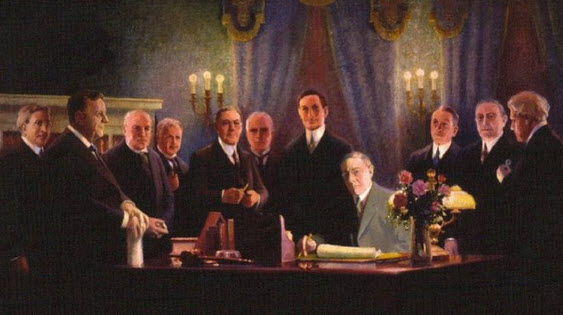
The Mid-1910s: Bankers Go to War
“The war should be a tremendous opportunity for America.â€
—Jack Morgan, personal letter to President Woodrow Wilson, September 4, 1914
On June 28, 1914, a Slavic nationalist in Sarajevo murdered Archduke Franz Ferdinand, heir to the Austrian throne. The battle lines were drawn. Austria positioned itself against Serbia. Russia announced support of Serbia against Austria, Germany backed Austria, and France backed Russia. Military mobilization orders traversed Europe. The national and private finances that had helped build up shipping and weapons arsenals in the last years of the nineteenth century and the early years of the twentieth would spill into deadly battle.
Wilson knew exactly whose help he needed. He invited Jack Morgan to a luncheon at the White House. The media erupted with rumors about the encounter. Was this a sign of tighter ties to the money trust titans? Was Wilson closer to the bankers than he had appeared? With whispers of such queries hanging in the hot summer air, at 12:30 in the afternoon of July 2, 1914, Morgan emerged from the meeting to face a flock of buzzing reporters. Genetically predisposed to shun attention, he merely explained that the meeting was “cordial†and suggested that further questions be directed to the president.
At the follow-up press conference, Wilson was equally coy. “I have known Mr. Morgan for a good many years; and his visit was lengthened out chiefly by my provocation, I imagine. Just a general talk about things that were transpiring.â€Though Wilson explained this did not signify the start of a series of talks with “men high in the world of finance,†rumors of a closer alliance between the president and Wall Street financiers persisted.
Wilson’s needs and Morgan’s intentions would soon become clear. For on July 28, Austria formally declared war against Serbia. The Central Powers (Germany, the Austro-Hungarian Empire, the Ottoman Empire, and Bulgaria) were at war with the Triple Entente (France, Britain, and Russia). While Wilson tried to juggle conveying America’s position of neutrality with the tragic death of his wife, domestic and foreign exchange markets were gripped by fear and paralysis. Another panic seemed a distinct possibility so soon after the Federal Reserve was established to prevent such outcomes in the midst of Wilson’s first term. The president had to assuage the markets and prepare the country’s finances for any outcome of the European battles.
Not wanting to leave war financing to chance, Wilson and Morgan kicked their power alliance into gear. At the request of high-ranking State Department officials, Morgan immediately immersed himself in war financing issues. On August 10, 1914, Secretary of State William Jennings Bryan wrote Wilson that Morgan had asked whether there would be any objection if his bank made loans to the French government and the Rothschilds’ Bank (also intended for the French government). Bryan was concerned that approving such an extension of capital might detract from the neutrality position that Wilson had adopted and, worse, invite other requests for loans from nations less allied with the United States than France, such as Germany or Austria. The Morgan Bank was only interested in assisting the Allies.

